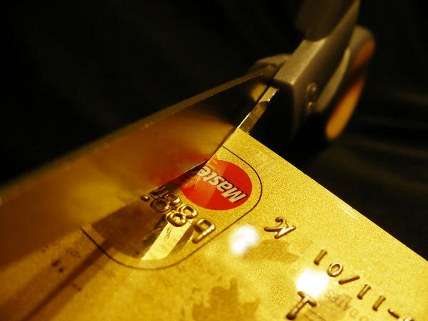Raising the Debt Ceiling Still Has Nothing To Do With "Default"

As Ed Krayewski noted earlier, the Senate voted 81 to 18 for a short-term fix to the debt ceiling battle, and the House promptly chimed in. Many press reports describe the vote as last-minute-ish salvation from defaulting on the national debt. The Associated Press insists the "Senate has voted to avoid a financial default and reopen the government after a 16-day partial shutdown." The problem with this version of events is that, like a credit card holder refused a credit extension, the federal government would have defaulted on its debt only if it refused to pay the interest on its current tab.
The Congressional Budget Office notes:
If the debt limit is not increased before the extraordinary measures are exhausted, the Treasury will not be authorized to issue additional debt that increases the amount outstanding…
The CBO goes on to say that failure to increase the debt limit "could lead to delays of payments for government activities and possibly to a default on the government's debt obligations," but that's a big maybe even from the federal government.
Greg Mankiw, Chairman of the Council of Economics under President Bush, the second, and now chairman of the Department of Economics at Harvard University, told Reason:
My sense is that if the Treasury prioritizes debt service over other spending, then the bond market should not fear default on government bonds
Lawrence H. White, a former visiting scholar at the Federal Reserve Bank of Atlanta, professor of economics at George Mason University, and a member of the Mercatus Center Financial Markets Working Group said to Reason:
Reaching the debt ceiling does not imply default on 'full faith and credit' Treasury debt, because the Treasury has more than enough income to make the interest payments due on the debt.
Harvard University's Jeffrey Miron told us:
[T]here are certainly things they could do in the short term to manage it even if we hit the debt ceiling. For example, we could prioritize which payments we make. Every single day, we're paying interest or credit orders, social security checks, salaries of government employees, on and on and on.
Steven Hess of Moody's says:
We believe the government would continue to pay interest and principal on its debt even in the event that the debt limit is not raised, leaving its creditworthiness intact. The debt limit restricts government expenditures to the amount of its incoming revenues; it does not prohibit the government from servicing its debt.
And Reason columnist and Mercatus Center research fellow Veronique de Rugy points out:
[I]f the debt ceiling is not increased, the Treasury can prioritize interest and debt payment to avoid a default.
How is that possible? Because the federal government still pulls in much more in tax receipts than it pays out in interest to service the debt.
Raising the debt ceiling isn't about avoiding default. It's about freeing the federal government to continue its borrowing spree.


Show Comments (42)